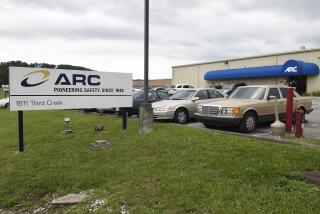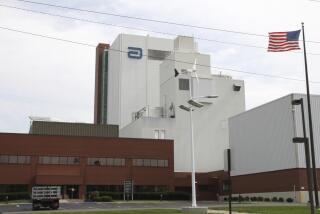County Will Investigate Maker of Breast Implants
- Share via
The Los Angeles County district attorney’s office opened a criminal investigation Thursday of Dow Corning Wright Corp., the leading manufacturer of silicone gel breast implants.
The probe--the first ever under a new state law, the Corporate Criminal Liability Act--is to determine whether the company sold the implants without fully disclosing information about their possible health hazards, officials said.
The investigation is another blow to Dow Corning Wright of Arlington, Tenn., which is under scrutiny by the U.S. Food and Drug Administration for possibly misrepresenting or withholding safety information about silicone gel breast implants. The FDA has declared a moratorium on the sale and use of the implants pending its review of additional safety data. Dow Corning Wright is a subsidiary of Dow Corning Corp. of Midland, Mich.
Robert Grupp, a spokesman for Dow Corning, called the inquiry “unnecessary.” He said the company had retained former U.S. Atty. Gen. Griffin Bell to conduct a “complete investigation” of the implants.
“The documents that (Reiner) seems to think suggest wrongdoing don’t (suggest wrongdoing) and will be available to the public the week of Feb. 10,” Grupp said.
In a letter to Dow Corning Wright’s president, Dist. Atty. Ira Reiner said that an initial review of reports and documents supplied to the FDA “indicate that an investigation is warranted.”
Reiner requested that Dow Corning Wright provide substantial information by Feb. 18, including laboratory data, internal memorandums and copies of informational and promotional material about the implants.
The Corporate Criminal Liability Act, which became effective Jan. 1, 1991, and was sponsored by Reiner’s office, makes it a felony for corporate managers to fail to provide regulatory agencies with written notification of a “serious concealed danger” associated with their product.
Punishment could include a prison term of up to three years and a fine of up to $1 million.
In an interview, Reiner said that the idea for the law “grew out of the Ford Pinto case,” in which knowledge of a gasoline tank defect that led to accidents and death was withheld from the public.
More to Read
Inside the business of entertainment
The Wide Shot brings you news, analysis and insights on everything from streaming wars to production — and what it all means for the future.
You may occasionally receive promotional content from the Los Angeles Times.










